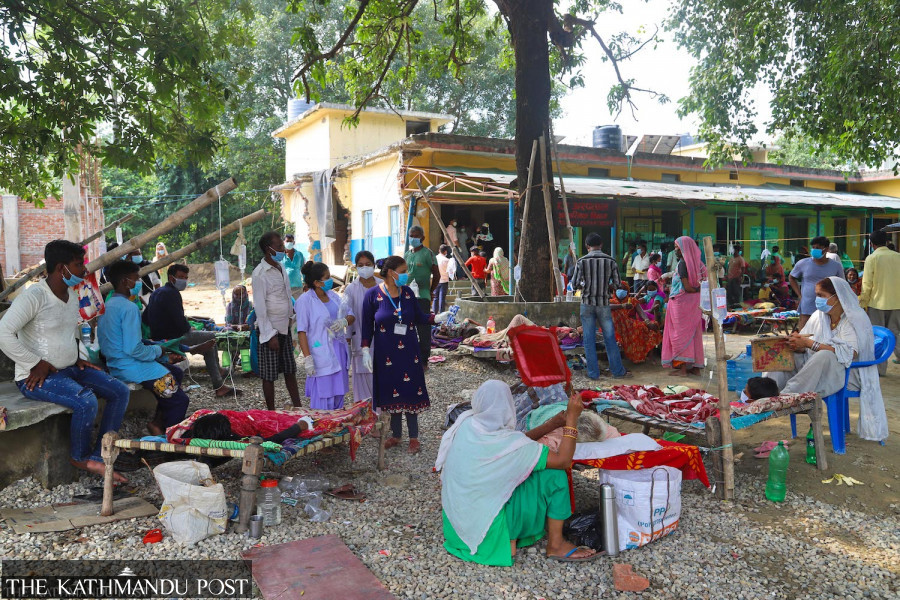Health
WHO to provide 252,363 doses of oral cholera vaccine for use in Kapilvastu
A deadly cholera outbreak last month in Krishnanagar Municipality of Kapilvastu killed at least six people. The diseasespilled over to Yashodhara Rural Municipality, Shivaraj Municipality and some areas of neighbouring Arghakhanchi.
Arjun Poudel
After all its efforts at containing the cholera outbreak that started in the first week of October in Krishnanagar Municipality of Kapilvastu, the Ministry of Health and Population has decided to launch a vaccination drive in the affected villages.
For this the World Health Organisation is providing 252,363 doses of oral cholera vaccine to Nepal.
“The World Health Organisation’s International Coordinating Group (ICG) Cholera Secretariat has informed us that our effort to get the oral cholera vaccine from the global stockpile has succeeded,” reads a statement issued by the Health Ministry. “We would like to inform that 252,363 doses of oral cholera vaccine will arrive in Nepal soon for the disease-hit areas and a vaccination programme will be launched.”
At least six people including three minors–seven- and two-year-old boys and a five-year-old girl–from Krishnanagar Municipality have died of the deadly disease. They died in the first week of October. Another deceased was a 45-year-old man. The Provincial Health Ministry of Lumbini Province said that additional two persons—one from Krishnanagar Municipality and another from Yashodhara Rural Municipality also succumbed to the deadly disease.
“Vaccination is needed in the disease-hit areas to contain a further spread,” Dr Bikash Devkota, secretary for Provincial Ministry of Health and Population, told the Post. “If we do not launch a vaccination drive, the deadly disease could remain in society as chronic a problem.”
Vibrio cholerae 01 Ogawa serotype was confirmed in stool samples of the infected people. Likewise, E. coli was found in the water samples in the disease-hit areas.
Cholera is a highly infectious disease that causes severe diarrhoea and vomiting, which leads to dehydration and even death within a few hours if left untreated. Escherichia coli, or E. coli, are bacteria that normally live in the intestines of people and animals. Most types of E. coli are harmless and even help keep the digestive tract healthy. But some strains can cause diarrhoea when one eats or drinks contaminated food and water.
The disease, which broke out in ward 7,8 and 9 of the Krishnanagar Municipality in the first week of October, has spread to nearby Yashodhara Rural Municipality and Shivaraj Municipality of Kapilvastu and adjoining areas of Arghakhanchi district.
Devkota informed that 61 people from Yashodhara Municipality have been infected so far.
“The focus of the vaccination campaign will be the people of the affected areas of Kapilvastu district,”Devkota said.
Officials say a ring vaccination is the only way to control the deadly disease that has claimed at least six lives and infected over 1,300 people.
Ring vaccination is a strategy to vaccinate those who are most likely to be infected. In the said strategy, everyone who has been or could have been exposed to a patient gets vaccinated creating a ‘ring’ of protection that can limit the spread of pathogens.
Earlier in 2014, when a cholera outbreak hit several villages in Rautahat, the ministry had carried out ring vaccination in the villages with the help of aid agencies.
Officials informed that over a dozen cases of cholera are being reported every day in the affected areas of the district.
Cholera continues to be a major killer in many poor countries which lack safe drinking water and proper sanitation infrastructure.
Nepal is also a cholera endemic country as cases of cholera are detected every year here. The disease also continues to be reported in Kathmandu Valley.
Doctors say poor sanitation and contaminated drinking water are the main factors for a cholera outbreak.
“Without coordinated efforts by all agencies concerned, the health agencies alone cannot do a lot to stop the spread of deadly diseases including cholera,” said Dr Baburam Marasini, former director at the Epidemiology and Disease Control Division.
Several agencies of the government, including those under the Health Ministry, Ministry of Water Supply and Sanitation, Ministry of Education, Science and Technology and non-governmental agencies spend millions of rupees every year to improve drinking water and sanitation. However, they have not brought the desired results.
Doctors say launching awareness drives against water-borne diseases and ensuring safe drinking water are the only ways to save people from water-borne diseases like cholera.
The World Health Organisation says cholera is a global threat to public health and an indicator of inequality and a lack of social development.
“Cholera is often predictable, preventable and can ultimately be eliminated where access to clean water and sanitation facilities, and satisfactory hygiene conditions are ensured and sustained for the whole population,” the UN health agency said in its report.
The UN health agency says that a multifaceted approach is key to controlling cholera and reducing deaths.
A combination of surveillance, water, sanitation and hygiene, social mobilisation, treatment and oral cholera vaccine are required to contain the spread of the disease.




 19.71°C Kathmandu
19.71°C Kathmandu















